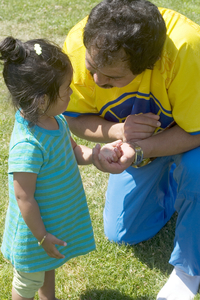Parents! You're in for a treat! The netherworld of emotion we grapple with daily comes alive in the new film, Inside Out.
We parents don't relish dealing with emotions! We've been urged to pat, rock, walk, sing, scold and threaten when crying crops up. We grudgingly deal with kids' feelings all day, then go to sleep at night hoping that tomorrow will be all sunshine and birdsong. Ain't gonna happen!
The movie offers encouragement to us parents to give a little breathing room to the world of emotions. We don't have much of a problem with Joy, of course, but on the screen, Sadness, Anger, Fear and Disgust are each winning in their own way, too.
If emotions are finally OK, we can begin to listen to our children's upsets. Not argue. Not explain. Not cajole. Listen. It's still our job to set necessary limits: to step in and be the barrier against biting, grabbing, wrecking, or hurting. When we hold a necessary limit, feelings will run through our upset child like storm water down a gully. It's noisy! It's messy! But then, the feelings clear away, and because we've cared, our child is surer that she's loved.
The acceptance of emotions is a new frontier in parenting, and a promising one. ETR Associates did a review of over 600 research studies to learn what is known about preventing teen pregnancy. They found that the strongest preventive factor is a feeling. A feeling. What might that powerful feeling be? A teen's sense of warm connection with their parent! And -- this was more than the researchers bargained for -- they found that the feeling of parent-child connectedness is a "super-protective factor" that prevents teen pregnancy and keeps teens from dropping out of school, drug use, tobacco use and violence. Connection. Not rejection.
By listening to our children's feelings, we can actively build that vital sense of parent-child connection. We've all noticed that while our kids are upset, they have a Teflon shield up against our words and demands. An upset child literally can't think. In the movie, hurt feelings drive Riley, the 11-year-old heroine, to run away. Her parents couldn't listen, so her sense of connection crumbles. She can finally remember their love when her tears begin to fall. She makes her way home, and her parents quietly embrace her. They listen. More tears fall, and warm connection is restored.
It may even be that listening to our children's feelings can enhance their intelligence. Neuroscientist Daniel J. Siegel, MD, says,
"Researchers have found that intense emotion by itself is not the problem. When parents provide support during difficult emotional experiences, children actually have the opportunity to develop a more sophisticated understanding of the mind."
Listening to feelings can mend deep rifts between parent and child. For example, one mother came to Hand in Hand Parenting in a terrible bind. Her toddler, diagnosed with failure to thrive, refused to take his medicine. Daily, she had to physically pin him down and force the liquid down his throat. She could see that he no longer felt safe with her. Their days were miserable. We suggested that she tell him, "It's time to take your medicine, sweetheart," stay close, and listen to his protest, all the way through. His tears and fears might need a way out. The first day, he cried for a long time, then reluctantly took his medicine. No battle. She listened to big feelings again for two more mornings. Each day he cried and stormed, she listened, and then he could tolerate his medicine. After that, he took his prescription willingly, and their relationship began to mend. Her respect for his feelings won him back to her.
Parenting is hard work. It's emotional work. It may be the hardest work we'll ever do. And listening to our children's feelings can be heartbreaking. But the alternative is costly. Small stresses keep mounting. Our children lose the light in their eyes. Their behavior gets tangled in upsets. Listening to them with love relieves their hearts, and most often clears their behavior, as well. And when we're all keyed up with our own sets of feelings, we need that same kind of support. A good listener! A kind adult to hold out respect for us, while we fume and fuss and change our energy from alone and negative to more connected, more ourselves.
Many good people still say that children's feelings and behaviors must be managed, like tigers in a cage, with rewards given with the parent's right hand, and punishment given with the left. But there's not much joy in administrating such a system, and the price for a child's compliance gets higher as she grows. We want our children to think, not comply! And in the end, we're happier when we can connect with our precious little ones. It's the shared giggles and that sense of no barriers between us that keeps our love for our kids alive.
So check out this movie! Meet the emotions that you've been told are a bad influence. Delight as they kvetch, deliberate, and vie to be heard. And then, on a good day, experiment. Listen warmly all the way through your child's meltdown. Feelings will pour out. Pour your caring in. You'll be an explorer on the frontiers of parenting.
